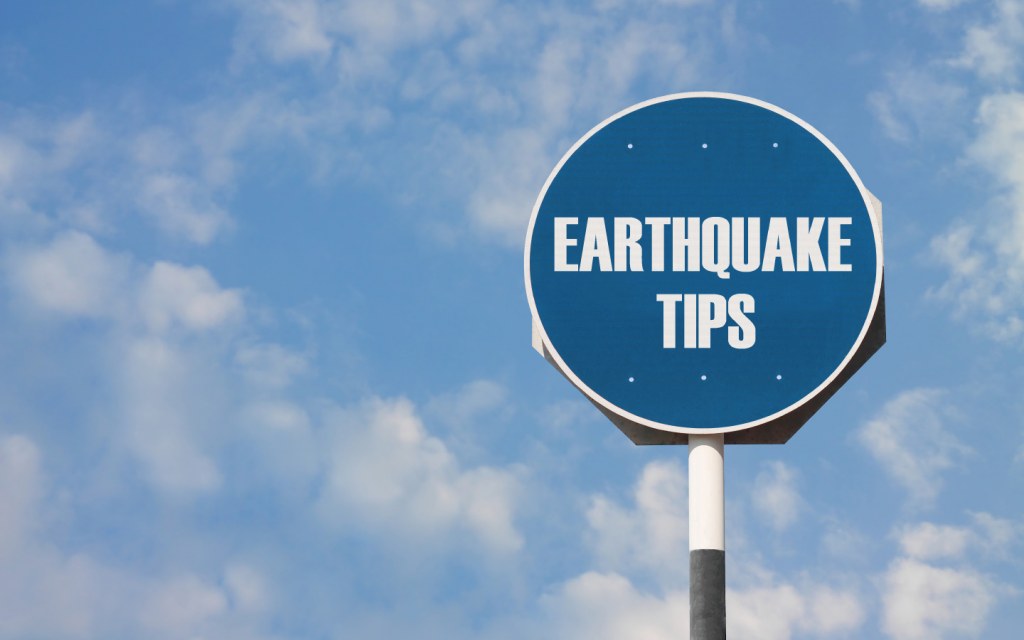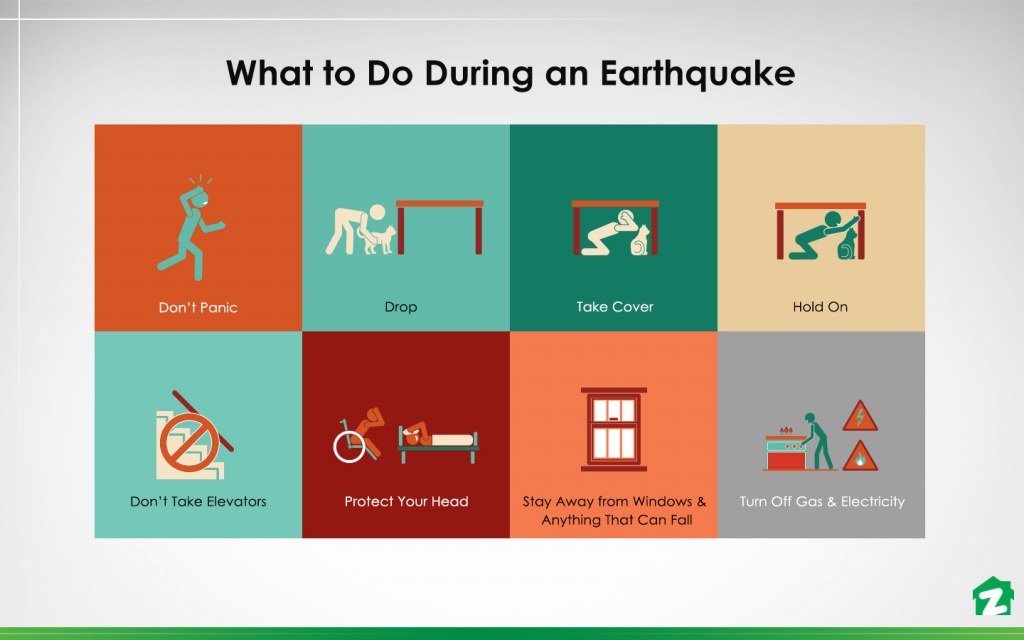IN THIS POST
Earthquakes don’t come with a warning and can occur anywhere. What may start as a normal day can quickly end in collapsed buildings and massive landslides, causing severe loss of lives and assets. Unfortunately, Pakistan is no stranger to such natural disasters. So, if you ever feel the earth suddenly shaking, follow these earthquake safety tips to ensure you and your family remains safe.
What to Do Before an Earthquake

For those who want to learn how to stay safe during an earthquake, here are a few preventive measures that can increase your chances of survival.
- Discuss a few earthquake safety procedures with your family. If you have children or the elderly in your home, sit down with them to discuss the layout of your place and what would be the easiest and safest way to get out of there. You should also plan an evacuation route for your office building and school.
- Practice the Drop, Cover and Hold On method both at home and at work. Find a sturdy table or desk that you can crawl under in case of an earthquake. Remember, this is an extremely important tip on how to prepare for an earthquake.
- Heavy furniture such as bookcases and wardrobes need to be bolted to the wall so they don’t fall over from the impact. The same should be done for electronic appliances, such as televisions and refrigerators.
- Don’t place any heavy objects above your wardrobe or on open shelves. At the very least, secure them to the wall or anchor them to the base. This will ensure they don’t fall on top of someone in the event of an earthquake.
- Always have an emergency supply kit ready. It is perhaps one of the most important earthquake safety tips. Ideally, a basic emergency kit should have at least three bottles of water, canned food and granola bars, a battery-operated flashlight and radio, extra batteries, fire extinguishers, prescription medicine and some cash. Do not forget to include a first aid kit as well. If you’re wondering how to make one, here is a list of must-have items for your first aid box. Furthermore, make sure this kit is easily accessible to everyone. Make more than one, if needed.
- You can also consider obtaining property insurance to reduce your losses in case of a powerful earthquake. Take a look at our guide to getting home insurance to find out more.
- Memorize important contact numbers and decide on a meet-up point in case you get separated from your family, friends or coworkers.
- If your house has any bending or crumbling walls, fix them immediately. These structural issues can lead to a collapse if you don’t take care of them.
What to Do During an Earthquake
Regardless of where you are or what you’re doing, here are a few common earthquake safety measures you should follow if you suddenly feel the ground rolling under your feet.

- Don’t Panic: It’s important to stay calm and use your head to get to the safe spot. Follow your earthquake evacuation plan for home if you’re indoors.
- Drop: Drop to the ground on your hands and knees. If you use a wheelchair, lock the wheels and stay where you are. Then, lean over and cover your head and neck with your arms.
- Take cover: Crawl under a heavy piece of furniture, such as a strong table or desk. Make sure to protect your head and neck by covering them with your arms as you look for a place to hide.
- Hold On: This is one of the most important earthquake safety measures. As soon as you get under a table or desk, hold on to it until the shaking subsides.
- Don’t Take Elevators: Elevators can get stuck between floors, leaving those stuck inside with no way to get out. It’s not advisable to take the stairs either. Just wait until the earthquake is over to make a move.
- Stay Away from Windows: Move away from glass windows and doors immediately. They can fall out and injure anyone standing nearby.
- Turn off Gas and Electricity: If you think it is safe for you to move around, try and turn off the gas and electricity supply to prevent any fires.
If you live or work near the coastline, please keep in mind that earthquakes can trigger large ocean waves. Therefore, move as far away from the beach and take shelter until the area is declared safe by the authorities.
What to Do During an Earthquake at School
One of the most crucial earthquake safety tips for kids is to find a safe spot. Instead of panicking and running around, take cover under your desk and stay there until help arrives.
A lot of schools hold safety drills to teach children how to survive an earthquake. It’s important for all students to not only participate in such drills but also remember the things they have learned in case of a natural disaster.
What to Do During an Earthquake at Home
Home is probably one of the safest places to be during an earthquake, as you would know the exact layout of the place and where you can take shelter. Once the ground stops moving, quickly move and grab your emergency supply kit and car keys. If the shaking starts again, stay hidden until you feel it’s safe to get out.
However, in case you are unable to get under something strong, crouch against an interior wall or flatten yourself against it. Always make sure that your head and neck are protected. Move to a safe spot as soon as you get a chance.
What to Do During an Earthquake at Work
Since offices in big cities are mostly located inside high-rises, an important earthquake safety tip would be to stay away from stairs and elevators. Of course, you might be tempted to get out of the building as soon as possible, but elevators can get stuck and people can get trampled while trying to escape through the stairs all at once.
If your office building has a fire exit, you can use it. Only run towards the stairs once the earth has stopped shaking. Moreover, don’t care about your personal belongings, except for your mobile phone and water bottle, while evacuating the building.
What to Do During an Earthquake If You Are Outside
Instead of running inside a building to take cover, stay outside and move away from power lines and electricity poles. Also, don’t stand too close to exterior walls, as they can crumble and topple over. Parks and open spaces are among the safest places to be during an earthquake.
Meanwhile, if you are in a vehicle when an earthquake hits your city, pull over to the corner of the road so that you’re not blocking the way for others and stay inside. It will also keep you safe from getting hit by another car. However, do not park your vehicle under bridges and underpasses.
Furthermore, turn on the radio and listen to the emergency announcements. It’s also suggested to lean over and place your arms above your head to protect yourself from any falling debris.
What to Do After an Earthquake

Now that you know the crucial earthquake safety tips, here are a few things you should do in its aftermath.
- Earthquakes are mostly followed by aftershocks, so be prepared to feel tremors after the initial quake.
- Tend to your bruises and scrapes. Help others with first aid if possible.
- Call your loved ones to confirm they are safe and inform them about your location. Don’t forget to check up on your neighbours/schoolmates/colleagues as well.
- Only call rescue officials if it’s an emergency.
- Check your home for structural damage and gas leaks. Do not light a match as it can cause a fire.
- If you think your home might collapse, get out immediately. However, make sure to take your emergency supply kit, house keys, car keys and your wallet along.
- Tune in to the radio or listen to the television for more instructions from the concerned authorities.
- Put on protective clothing and shoes to prevent any injuries from broken glass and debris.
- If possible, fill up a few buckets with tap water as you never know when it might run out.
Following these safety tips before, during and after an earthquake can increase your chances of survival.
Emergency Hotline Numbers in Pakistan
Apart from taking these earthquake safety measures, memorize the numbers for rescue officials so you would know whom to call if you need help.
Here are a few important helpline numbers for Lahore, Karachi and Islamabad.
| Organization | Lahore | Karachi | Islamabad |
| Rescue Service | 1122 | 1122 | 1122 |
| Police Emergency | 15 | 15 | 15 |
| Civil Hospital | 042-9921110-9 | 021-99215960 | 052-5550311 |
| Edhi Ambulance | 115 | 115 | 115 |
Meanwhile, if you are interested in disaster-proofing your house, here is a detailed guide on how to construct an earthquake-resistant building that might help you out. If there are any such buildings in your area, you can also seek shelter there as they provide protection against earthquakes.
To find out more earthquake preparedness tips, stay tuned to Zameen Blog, the best real estate and lifestyle blog in Pakistan. If you have any questions or suggestions, drop us an email at blog@zameen.com. Also, don’t forget to visit and like our Facebook page to learn about the latest investment opportunities near you.



